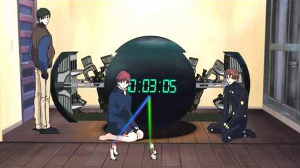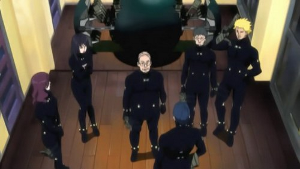Gantz is a hyper-violent anime, adapted from an even more outrageous manga, that posits a very unusual interpretation of the afterlife. Imagine if you didn’t actually die at the exact moment your body dies. Instead of being done with the mortal life, your spirit is transported into an artificial copy of your body. You wake up, pixel by pixel, inside a strange room with a large glowing orb. When the room is filled, you’re instructed that you have one hour to kill an alien with bizarre weaponry and black skin-tight suits or you lose. Instead of passing on, you’ve been temporarily delayed in a cryptic game show with real life or death stakes.

The game generates your new body in Gantz
Gantz is best known for the violence and overt sexuality of the series. It’s a seinen manga, targeted at men ages 18-30, and it’s filled with perverted sexual encounters and even sexual assault. The images, animated in all too loving detail for the anime, are intentionally over the top and offensive. For me, they’re a huge blemish on a very well-conceived dark sci-fi universe exploring the mysteries of life and death.
Because of the graphic content, Gantz is often dismissed as just that series with x, y, or z. There is a lot more to dig into, though, because of the direction of the anime.
Hiroya Oku’s now 380 chapter and growing manga is not a hopeful piece of literature. The philosophy of the ball’s twisted game is almost nihilistic. The ball radically changes the rules if a contestant is doing too well and attempts to drive the player insane.
By the time they earn 100 points and can free themselves, they’re offered three prizes. The first is freedom, including the elimination of all memories of ever participating in the game. This is, more often than not, the goal of the player.
The second is the total wild card. The player will be gifted a super powerful weapon that will make their time in the game much easier. The ball is counting on the player developing a combination of bloodlust and Stockholm syndrome. Whoever or whatever is watching just wants the body count and they will manipulate the game to get those results.

The competitors in Gantz never know what they’re up against
The anime adaptation by Gonzo pushes the story in a completely different direction. The first season is as faithful as it can be with TV censorship standards. The second season is a different situation entirely.
One of the more upsetting missions in the early chapters of the manga is the battle against the temple statues. The competitors have 90 minutes to destroy all the living statues in a sprawling Buddhist temple. It doesn’t end well for anyone.
Both the anime and the manga have a Buddhist priest has entered the game and is convinced prayer is the only way to survive the ordeal. When he begins to chant in front of an altar, the giant statues stop moving and just stare at him. They no longer attack the competitors. The priest stops praying long enough to admonish his fellow competitors for resorting to violence. Unfortunately in the anime, before he can pray again, a large living statue crushes him.
In the manga, the outcome is the same but the timing is different. There are panels that clearly show the priest fully chanting again and the statues disregard his efforts. They kill him in cold blood even as he praises them in his final moments on earth. The manga does not follow or uphold any earthly doctrines.

 When Funimation secures a license for a new show, they put together their in-house creative team. As many as seven separate shows are being worked on in different studios at a time with an regular work schedule of 10AM to 6PM. The director is given the translated scripts, character descriptions, and images from the show. However, they’re in charge of researching the show and influences to figure out the crux of the series. They plan for as long as the production schedule allows them so they can figure out the right tone and approach for the translated program.
When Funimation secures a license for a new show, they put together their in-house creative team. As many as seven separate shows are being worked on in different studios at a time with an regular work schedule of 10AM to 6PM. The director is given the translated scripts, character descriptions, and images from the show. However, they’re in charge of researching the show and influences to figure out the crux of the series. They plan for as long as the production schedule allows them so they can figure out the right tone and approach for the translated program.
